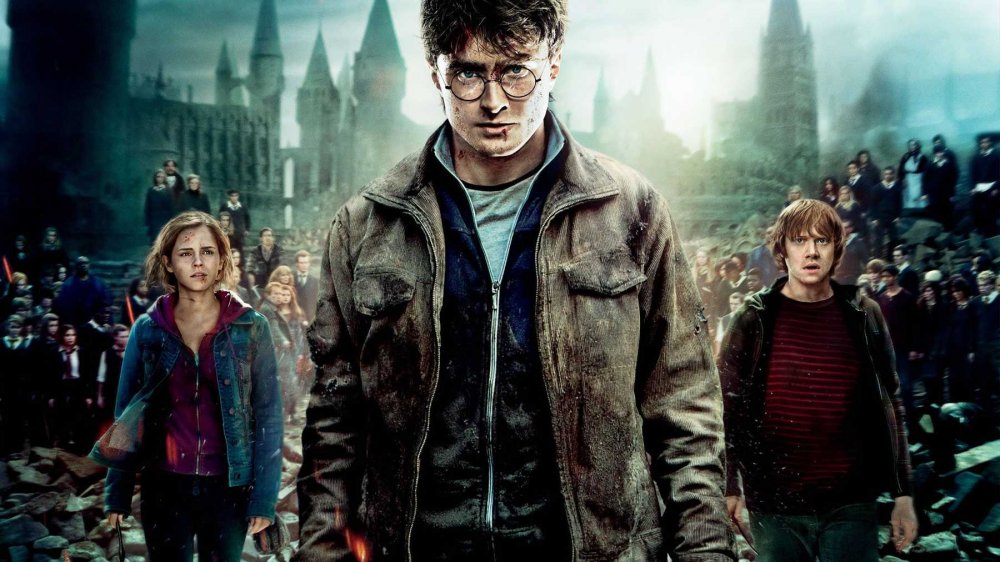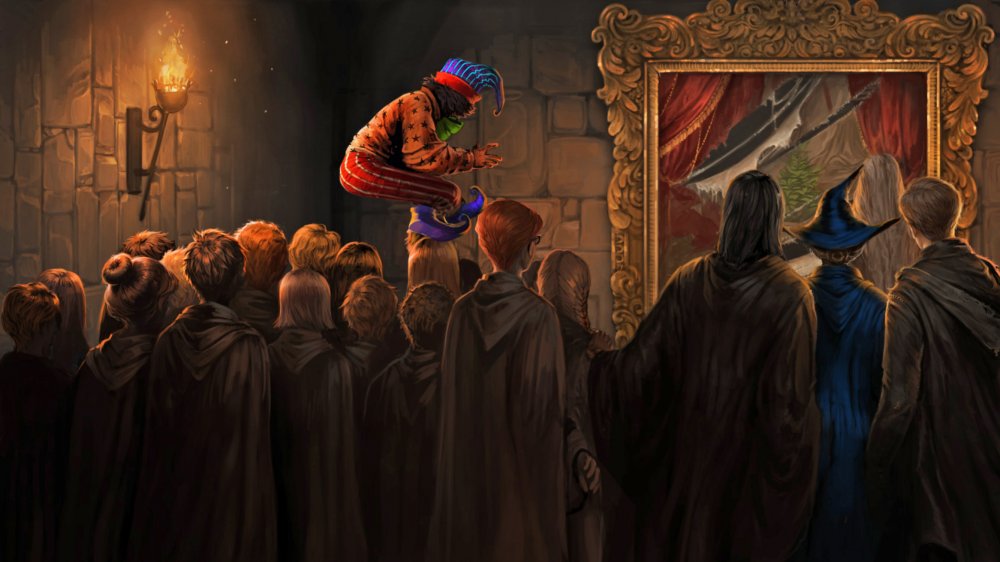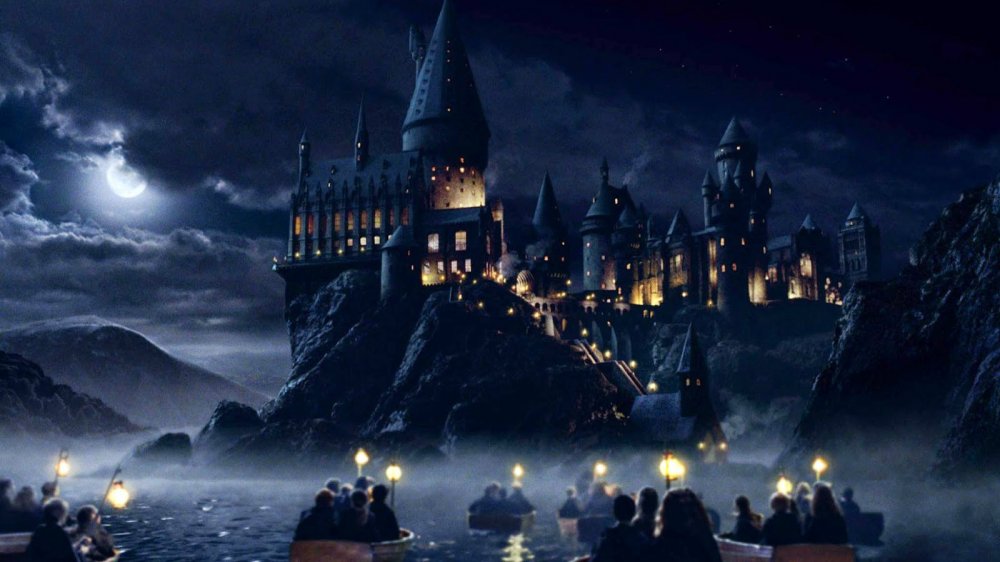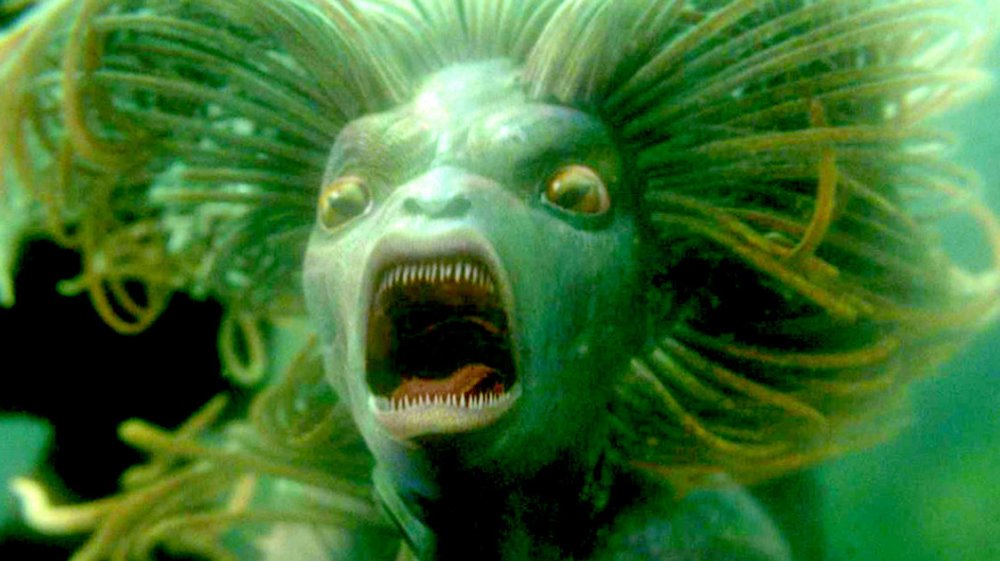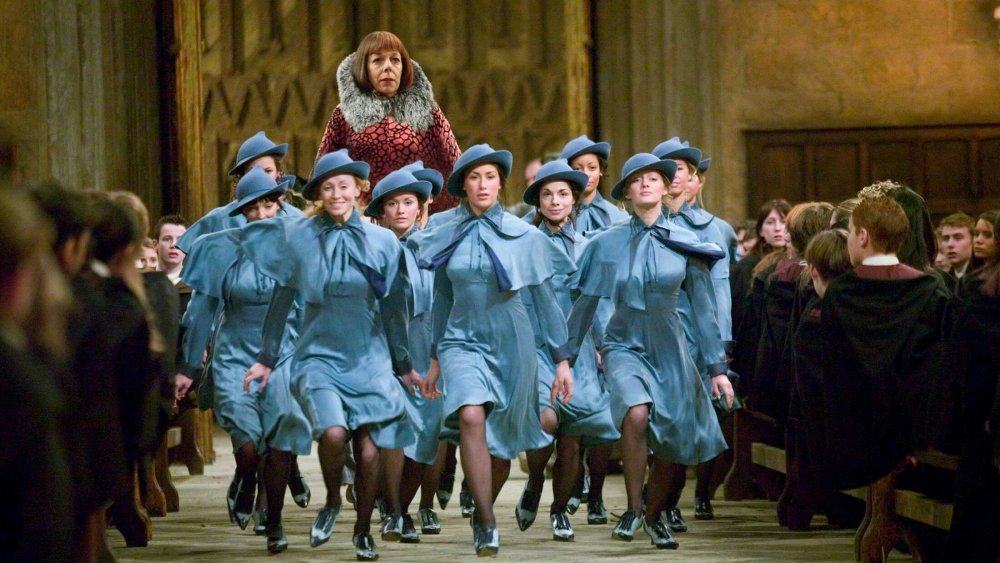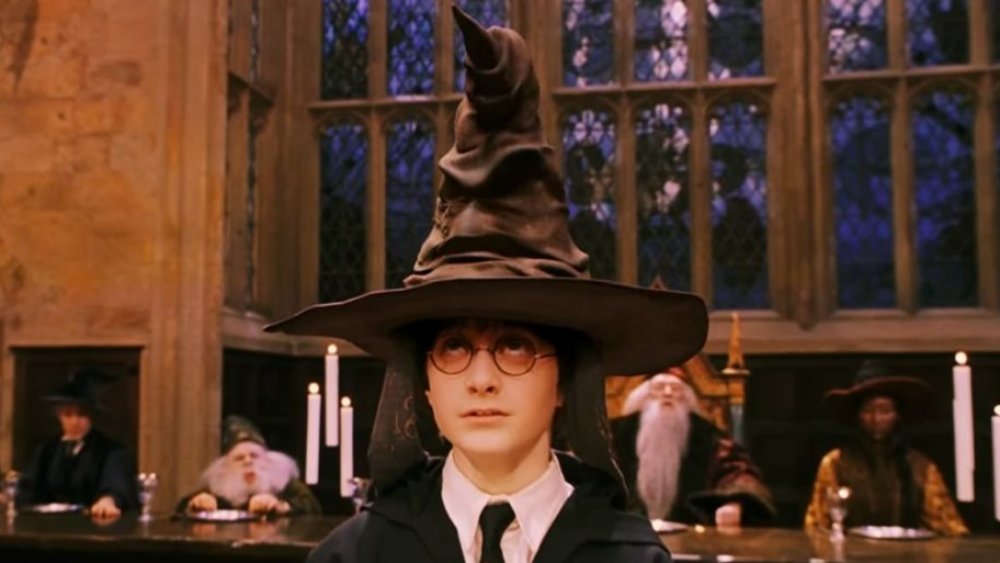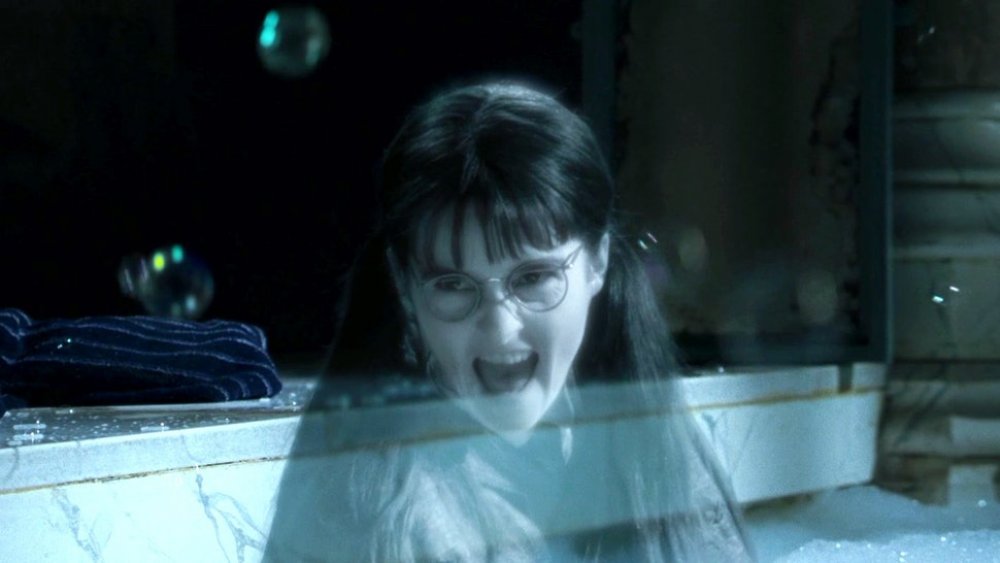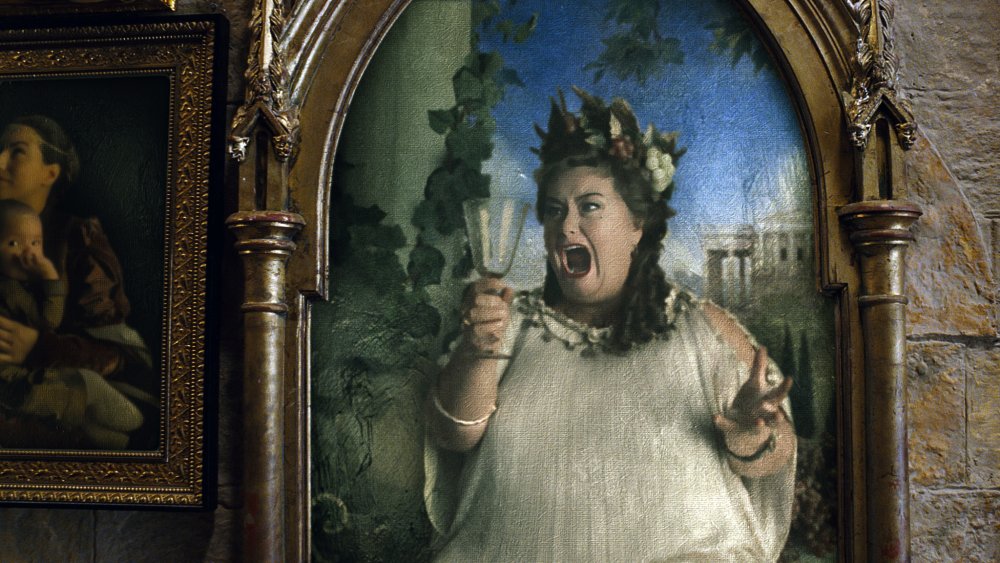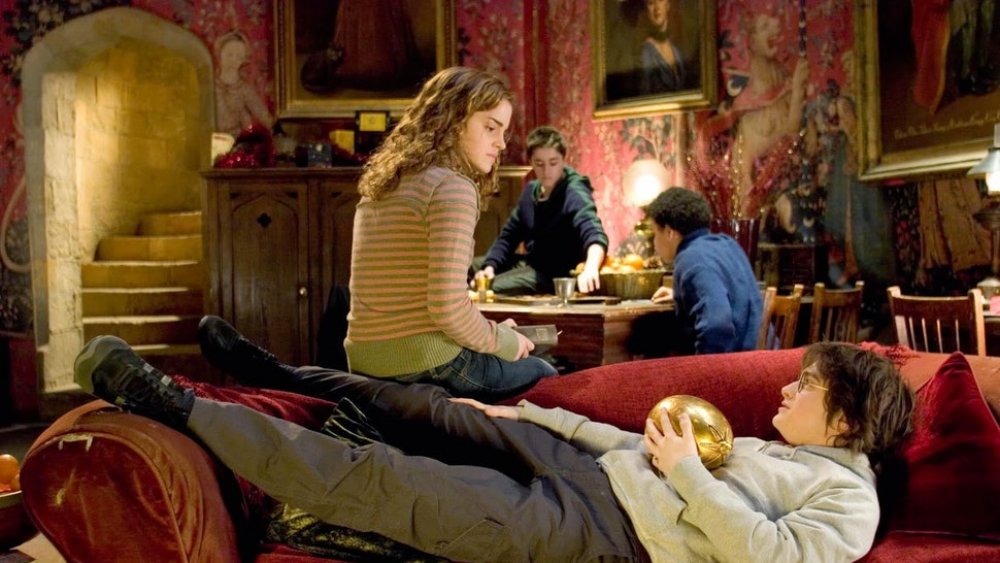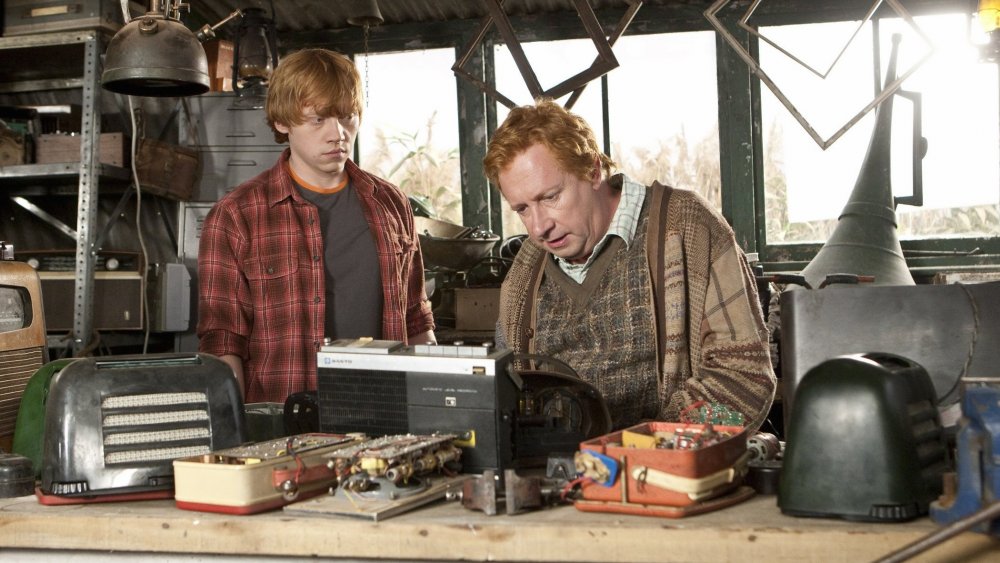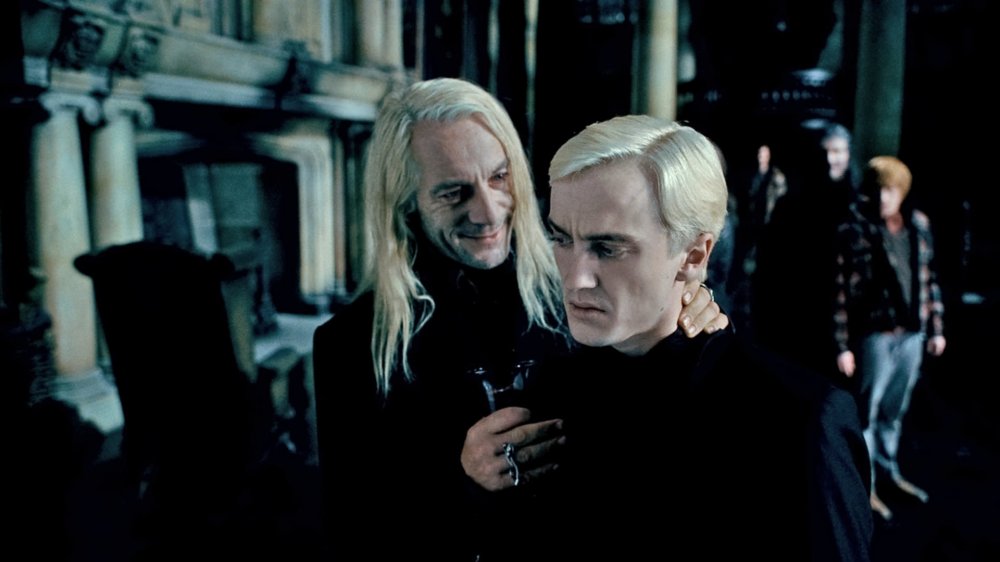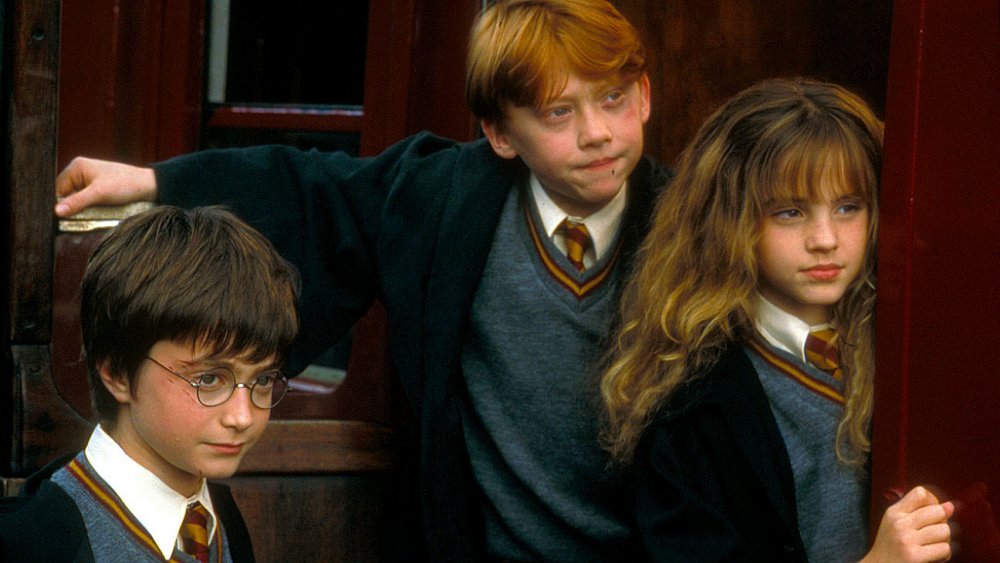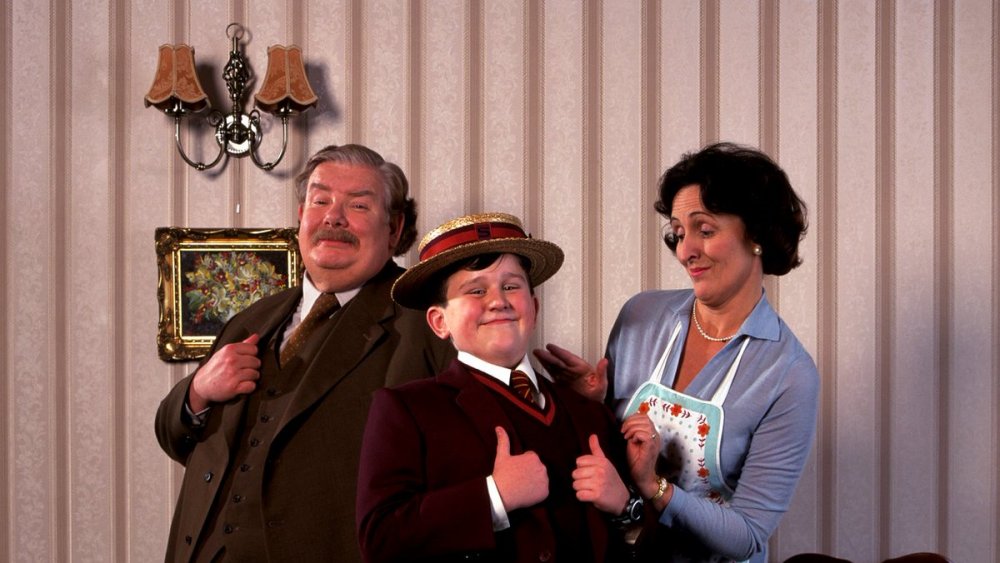False Things You Believe About Hogwarts
With a combined 4,224 pages in the Harry Potter series — plus a whole lot of extra material — Hogwarts' lore is as vast as its grounds. The films make the castle even more complex in the minds of many. With 10 centuries of education to its name, Hogwarts stands as one of fantasy literature's most memorable locations.
It's understandably easy for fans to get their wires crossed when it comes to the mysterious castle. With a history this dense, most fans end up making assumptions — especially when it comes to things left unexamined by the books. Take electricity: Is it banned, or does it not work? Fans also fall into the trap of misremembering things from the books they read in their younger years. And none of this is even getting into online rumor-mongering, where badly-sourced "facts" can endure for years.
As Dumbledore repeatedly says, help will always be given at Hogwarts to those who ask for it. We're here to help by debunking every incorrect thing you've ever assumed about Britain's most celebrated school of magic.
Peeves is a ghost
Peeves, a naughty little sprite with a passion for pranks, is easy to think of as one of Hogwarts' many ghosts. He is, in fact, a poltergeist — meaning he was never a real person at all. By definition, ghosts in the Harry Potter universe are dead wizards and witches who choose to remain in the corporeal world instead of moving on. Only magical folks have this option, and once it's done, it can't be undone.
In contrast, Peeves was essentially, if unintentionally, created by Hogwarts students. Poltergeists form where there are high level of energy, magic, and emotion – a school full of teenagers is, as a result, a perfect breeding ground. It was only a matter of time before Hogwarts produced a poltergeist, and there's no getting rid of him — as J.K. Rowling herself once put it, Peeves is like "dry rot ... it comes with the building." He's about as old as the school itself, and he'll be there until its end.
Peeves' abilities are especially potent for a poltergeist. Many have tried to expel him over the years, but a face-off in 1876 involving a cannon put an end to these ill-fated attempts. A contract was signed with then-Headmistress Eupraxia Mole, ensuring some level of decency on Peeves' part in exchange for certain privileges. He's tiny, he floats, and he has a knack for showing up at the worst possible time — but he's part of the Hogwarts package.
Hogwarts is in England
It's easy to slip into the assumption that Hogwarts is in England, especially for fans living outside the United Kingdom. However, the Hogwarts Express actually rolls up to the Scottish Highlands on September first. In the wake of 1692's International Statute of Secrecy law, numerous ways of getting to Hogwarts without being seen were devised. Portkeys were the most popular, but came with nasty side effects and a confusing time slot system. It wasn't until 1830 that Minister for Magic Ottaline Gambol proposed the now esteemed steam train. Though pure-blood families balked, dissent didn't last long — especially once the Ministry made it clear that not riding the train meant not attending the school.
Despite Hagrid's insistence that there's "no place safer" than Hogwarts, the castle has seen plenty of death and dismay over its thousand-year history. The openings of the Chamber of Secrets during the 1942-1943 and 1992-1993 school years are considered particularly dark stains on the school's history. Regardless, Hogwarts has never closed.
Various castles were used to portray Hogwarts in the movies, but Alnwick Castle in England provided many of the most iconic shots of the wizarding school. It has also been used as a filming location for Downton Abbey.
The giant squid is malicious
If you're a bright-eyed first-year Hogwarts student and someone tells you there's a giant squid in the Great Lake, you're probably not going to go anywhere near it. In truth, the idea that the larger-than-life squid is dangerous likely began as a way of keeping students from the depths of its black waters. In reality, the giant squid is probably the least threatening creature in the Hogwarts lake.
Even the misunderstood beast's Chocolate Frog card won't give it a break: It labels the squid as " the bane" of students who want to go for a "dip in the lake." That's not true at all, though. The squid is, in fact, semi-domesticated, and even moonlights as a lake-bound lifeguard. During Harry's fourth year, Dennis Creevey falls out of his boat during the journey to Hogwarts — and the squid plops him right back into the vessel without missing a beat. Given that Dennis later bursts with excitement to tell the story, it couldn't have been all that scary.
The squid has a playful side as well, allowing Fred, George, and Lee Jordan to tickle its tentacles. Perhaps it knows it has a good thing going on, evidenced by the times Harry tosses toast into the lake for the squid to snack on. Free food in exchange for staying chill and handling occasional first-year accidents? That's a sweet deal.
Hogwarts is the only wizarding school
Anyone who hasn't read or seen Harry Potter and the Goblet of Fire might not realize that Hogwarts isn't the only wizarding school in the Harry Potter universe. In fact, though you might have dreamed of receiving your own Hogwarts letter, there's a good chance you'd have never had the option of attending at all: Hogwarts only serves the magical community of the United Kingdom.
A total of 11 prestigious schools of magic exist, in addition to many smaller establishments. During the Triwizard Tournament, Hogwarts hosts delegations from Durmstrang and Beauxbatons, which are located in the far north of Europe and the French Pyrenees respectively. Both schools are co-ed, despite the movies' portrayal of them as gender-segregated: French natives Nicolas Flamel and his wife Perenelle both attended Beauxbatons. Durmstrang, on the other hand, is notorious for including the Dark Arts in its curriculum. It is perhaps unsurprising, then, that Gellert Grindelwald is an alum.
American fans will be pleased to learn of Ilvermorny, the United States' most well-respected school of magic. Orphaned witch Isolt Sayre founded the castle, which also has four houses: Horned Serpent, Wampus, Thunderbird, and Pukwudgie.
The sorting hat always sorted students
It's hard to imagine Hogwarts without the Sorting Hat. But in fact, the hat wasn't even the first method of student sorting J.K. Rowling contemplated. Complex machines and statues of the founders were in the running, but these options were "too easy" and "not quite right." Eventually, she devised the Sorting Hat. Before the old hat determined incoming students' Hogwarts houses, however, the founders sorted first years themselves. Harry's fourth year Sorting Hat ceremony reveals this tidbit in its welcoming song: "While still alive they did divide/ their favorites from the throng."
Knowing they were not immortal, the founders put their heads together to create a long-term sorting solution. According to the Sorting Hat, "The founders put some brains in [it] so [it] could choose instead." According to legend, it once belonged to Godric Gryffindor, though the magic that empowers it was a four-person effort.
The Hat has chosen students' Hogwarts house ever since. However, the hat does consider the student's own opinions and desires. It focuses as much, if not more, on what students value rather than what they are, meaning that few are doomed to a house they truly do not belong within.
Ghosts are unregulated
Anyone who's planning on becoming a ghost to squeeze in a little more living should probably rethink that decision. Consider Moaning Myrtle, who gave up her chance of moving on to her "next great adventure" when she decided to stick around and haunt her childhood bully, Olive Hornby. It's a comprehensible choice, especially from a kid's perspective: Myrtle was killed while crying in a bathroom stall after Olive made fun of her glasses. Since she couldn't haunt the basilisk that killed her, Myrtle chose an un-lifetime of despair instead.
Myrtle didn't get to torment Olive the way she'd imagined, however. After Myrtle crashed her brother's wedding, Olive decided to take her ghostly issue to the Ministry of Magic. It's unclear exactly how the Ministry controls ghosts, but they ordered Myrtle back to Hogwarts. There she haunts the second-floor bathroom stall where she died, forever condemned to eavesdrop on other, living children's lives. The moral of the story? Don't become a ghost out of spite. Eternity is a long, long time to spend in a bathroom.
All houses have a password
The Gryffindor common room takes center stage in the Harry Potter series, given its title character's presence within the house. But while Gryffindors must recite a password to gain access to the common room and dormitories, not every house works that way. Despite their bitter rivalry, Gryffindors and Slytherins are two sides of the same coin in this regard, as Slytherins also use passwords to protect their living quarters.
In much the same way wizards gain entrance to Diagon Alley, Hufflepuffs must tap the barrels outside their common room's entrance, located near the kitchens. If they tap in any other rhythmic sequence besides "Helga Hufflepuff," the intruder is doused with vinegar.
Ravenclaws have the most challenging time trying to get into their own common room: They gain access by answering riddles. One example of a Ravenclaw riddle is, "Which came first, the phoenix, or the flame?" Luna Lovegood answers the riddle with ease: "A circle has no beginning." Imagine getting that one riddle you just can't crack, and having to wait for someone to save you. The teasing would be merciless.
Boys and girls can enter each others' dormitories
Though Hermione is able to enter Ron and Harry's dormitory to relay important news, the boys do not enjoy the same access. As Ron discovers when he attempts to climb the staircase to the girls' dorms in Order of the Phoenix, the stairs melt away into a stone slide that sends him back to the bottom. When Ron recalls Hermione's earlier visits to their quarters, she admits that it's an outdated rule. According to her readings into Hogwarts history, the founders believed girls to be "more trustworthy" than boys — thus, the lopsided rule.
Many fans take issue with this particular detail in light of Rowling's controversial statements on gender. This might be one case where "headcanon" is better than actual canon for fans who are uncomfortable with implications of who is allowed on which staircase, and how the charm in question "knows" how students identify.
Muggle technology is banned
At first glance, it seems like Hogwarts bans Muggle technology. This wouldn't be surprising, given wizards' rampant distrust of muggles. But regardless of deep-rooted biases towards the non-magical community, Hogwarts doesn't actually ban muggle technology. It's a moot point, in fact: Advanced muggle technology simply doesn't work at Hogwarts. As Hermione tells Ron and Harry in Goblet of Fire, tech goes haywire at Hogwarts due to high levels of magic.
Some wizards like Arthur Weasley have taken to tinkering with muggle objects to make them run on magic. Wizard radios are an example of tech that has undergone this process on a mass scale: Radios work at the castle because they've been magically altered. Most wizards scoff at anything more advanced, and even believe embracing devices like dishwashers points to magical inadequacy. But in the age of smartphones, it seems likely that even the most staunch pure-blood family might have to make some sacrifices. There is, after all, no magical equivalent to Candy Crush.
Merlin was a Gryffindor
Gryffindors take the spotlight in the Harry Potter series. As such, that house's prejudices, attitudes, and rivalries become most fans'. Slytherin equals bad and Gryffindor equals good in the minds of many because of this — but in fact, some of the greatest wizards in history were Slytherins. Snape, the man Harry ends up naming his son after in tribute to "the bravest man [he] ever knew," is one particularly bright example. Another is already familiar to fans as well: Merlin.
That's right: Merlin of Arthurian legend donned green and silver during his time at Hogwarts. Legend has it, in fact, that the Order of Merlin, one of the wizarding world's highest honors, bears a green ribbon in tribute to his house. Centuries later, even Gryffindors hold him in such esteem that "Merlin's beard" is a common magical exclamation. And really, is there any higher honor than being the name someone yells out upon stubbing their toe?
Parents pay for tuition
Have you ever wondered how the Weasleys are able to afford sending all seven of their children to the hallowed halls of Hogwarts? As it turns out, they don't have to pay at all — and neither does any other Hogwarts parent. Though some families like the Malfoys are able to afford a private school education (and then some), J.K. Rowling revealed in a tweet that the Ministry of Magic fully covers Hogwarts tuition. Can we get this going for muggle colleges? Pretty please?
This might seem like a major bill for the Ministry to foot, but in fact, it's likely smaller than you'd expect. Back in 2000, J.K. Rowling put the student population of Hogwarts at around 1,000 kids. Fans have been trying to hash that number out ever since, leading to a number of interesting theories. One of the most popular surmises that Harry's class size is unusually small due to the effects of Voldemort's reign of terror. That's a pretty dire reason for Hogwarts' small class sizes ... but it does mean that Hogwarts puts a whole lot less strain on the ministry's coffers. Somewhere, a particularly icky magical politician probably considers this a win.
Attendance is mandatory
Believe it or not, homeschooling young witches and wizards is more common than sending them off to school — especially in remote areas of the world. As the Harry Potter series takes place almost entirely within Hogwarts, this is easy to forget, but parents do, in fact, have the choice to homeschool. Dumbledore's younger sister, Ariana, is one example of this choice: She didn't attend Hogwarts after suffering a traumatic attack. Ilvermorny's founder, Isolt Sayre, was also barred from attending Hogwarts by her homicidal aunt. As Voldemort grows in power and Hogwarts becomes less safe towards the end of the Harry Potter series, homeschooling becomes more common among Harry's classmates.
It's unclear how underage magic use is handled for homeschooled children, as the Ministry of Magic is quick to crack down on the practice. Harry gets a stern letter from Ministry bureaucrat Mafalda Hopkirk for breaking the Decree for the Reasonable Restriction of Underage Sorcery in Order of the Phoenix, and almost faces expulsion from Hogwarts. Adults of authority appear to be able to get around this rule, however, as Dumbledore permits Harry to use defensive magic beyond Hogwarts' grounds in Half-Blood Prince. Perhaps homeschooling parents are allowed similar exceptions to the rule?
Muggles can't enter
Mr. and Mrs. Dursley of number four Privet Drive are proud to say that they are perfectly normal, thank you, very much — they wouldn't be caught dead inside a magical place like Hogwarts. But that doesn't mean that they couldn't visit their nephew at school if they so desired. Chamber of Secrets offers an especially sad example of this fact: Moaning Myrtle's muggle parents were able to visit the school to retrieve their daughter's body in the 1940s. That's not the only proof of this openness — Harry is terrified the Dursleys might show up during the Triwizard Tournament. Luckily for him, his abusive family wanted no part of the deadly festivities, but there's no indication that Dumbledore would have prevented them from coming if they desired.
Hogwarts appears to be a dilapidated ruin to muggle eyes, deterring all trespassers. One wonders if all muggle parents are on a list somewhere, so Dumbledore can remember who to lift the enchantment for. It seems likely that at some point in Hogwarts' history, someone in charge has probably forgotten to do this, meaning that at least one poor muggle parent has probably had to wander around a barren field of crumbling walls for hours, clutching the cauldron their kid forgot at home.
